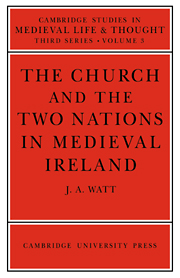Book contents
- Frontmatter
- Contents
- LIST OF MAPS
- FOREWORD
- ACKNOWLEDGMENTS
- ABBREVIATIONS
- 1 THE CHURCH IN IRELAND ON THE EVE OF THE INVASION
- 2 THE ESTABLISHMENT OF THE NEW ORDER
- 3 THE NEW ORDER CONSOLIDATED
- 4 THE CRISIS OF THE CISTERCIAN ORDER IN IRELAND
- 5 ECCLESIA HIBERNICANA
- 6 THE CLERGY AND THE COMMON LAW, 1255–91
- 7 THE CLERGY AND THE COMMON LAW, 1295–1314
- 8 THE EPISCOPATE IN THE REIGN OF EDWARD I
- 9 FOURTEENTH CENTURY DEVELOPMENTS
- 10 THE STATUTE OF KILKENNY
- APPENDIX 1 Canterbury's claim to primacy over Ireland
- APPENDIX 2 The Armagh election dispute, 1202–7
- BIBLIOGRAPHY
- INDEX
9 - FOURTEENTH CENTURY DEVELOPMENTS
Published online by Cambridge University Press: 28 October 2009
- Frontmatter
- Contents
- LIST OF MAPS
- FOREWORD
- ACKNOWLEDGMENTS
- ABBREVIATIONS
- 1 THE CHURCH IN IRELAND ON THE EVE OF THE INVASION
- 2 THE ESTABLISHMENT OF THE NEW ORDER
- 3 THE NEW ORDER CONSOLIDATED
- 4 THE CRISIS OF THE CISTERCIAN ORDER IN IRELAND
- 5 ECCLESIA HIBERNICANA
- 6 THE CLERGY AND THE COMMON LAW, 1255–91
- 7 THE CLERGY AND THE COMMON LAW, 1295–1314
- 8 THE EPISCOPATE IN THE REIGN OF EDWARD I
- 9 FOURTEENTH CENTURY DEVELOPMENTS
- 10 THE STATUTE OF KILKENNY
- APPENDIX 1 Canterbury's claim to primacy over Ireland
- APPENDIX 2 The Armagh election dispute, 1202–7
- BIBLIOGRAPHY
- INDEX
Summary
ACCEPTIO PERSONARUM
Surveying the history of Ireland throughout the thirteenth century it is possible to extract two different, even contradictory, lines of interpretation of the main trends of development. On the one hand, there is the trend towards the consolidation of the control of the Crown whose authority became progressively more effective and extensive as the century wore on and was still expanding even after the death of Edward I. With this royal progress, it might be argued, came a certain lessening of the hostility of the peoples, even movement towards integration, shown in a certain disposition, on the one side, to admit Irishmen to parity of status at common law and, on the other, to acknowledge the desirability of achieving such status. On the other hand, however, the history of the thirteenth century may be read as the progressive revelation of the impossibility of such integration, of the unbridgeable nature of the cleavage between the nations, demonstrated, on the one side, by the absence of any disposition to statesmanship in the form of generosity or magnanimity towards the conquered, and, on the other, by obstinate refusal to submit to force majeure.
Whether or not these two antithetic lines of interpretation form a valid approach to the general history of Ireland in the thirteenth century, they can certainly be seen in the history of the Irish Church. Both trends can there be seen in operation.
- Type
- Chapter
- Information
- The Church and the Two Nations in Medieval Ireland , pp. 173 - 197Publisher: Cambridge University PressPrint publication year: 1970



